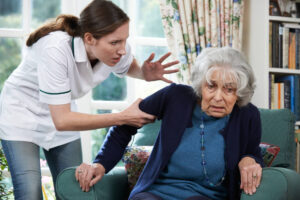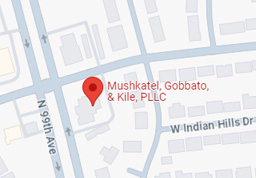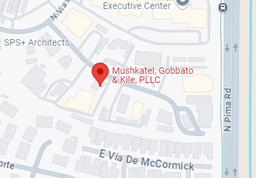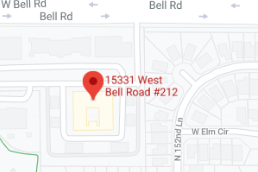
The AARP predicts that the number of Arizona residents over age 85 will grow by 135 percent by 2030. Many of these seniors move to one of the state’s nursing homes or long-term care facilities for their remaining years. Unfortunately for these vulnerable citizens, not all nursing homes follow their duty to protect their residents.
The decision to put a loved one in a nursing home is difficult for any family. You trust that the facility will provide your family member with the care and support they need to enjoy their golden years. Discovering evidence of abuse and neglect is understandably horrifying. Nursing home abuse robs seniors of their rights and dignity, causing unimaginable pain and emotional distress.
At the law firm of Mushkatel, Gobbato, & Kile, P.L.L.C., we take nursing home abuse claims seriously. These facilities should be places of comfort and support, not fear and degradation. Let us help you hold negligent nursing homes accountable for their wrongdoing. Call or contact us today for a consultation with a Glendale, AZ nursing home abuse and neglect attorney.
Table of Contents
- What Are Some Common Types of Nursing Home Abuse and Neglect in Glendale, AZ?
- How Would I Know If My Loved One Is a Victim of Nursing Home Abuse?
- Who Can Be Held Liable for Nursing Home Abuse?
- What Sort of Damages Can Be Recovered in a Nursing Home Abuse Claim?
- What You Should Do If You Suspect Nursing Home Abuse
- Is It Possible to Remove a Resident from a Nursing Home If I Suspect Abuse?
- Contact a Nursing Home Abuse and Neglect Lawyer in Glendale, AZ Today
What Are Some Common Types of Nursing Home Abuse and Neglect in Glendale, AZ?
Many nursing home abuse cases in Glendale involve:
- Physical abuse: Performing any violent act on a nursing home resident constitutes physical abuse. Examples include hitting, kicking, slapping, biting, burning, and pushing.
- Emotional or psychological abuse: Intentionally inflicting harm on a resident through verbal or nonverbal threats is emotional abuse. Humiliating a resident, ignoring or isolating them, using threatening body language, or other actions to create fear are abusive behaviors.
- Sexual abuse: Unwanted sexual contact or intimate contact that occurs when a resident does not have the physical or cognitive ability to consent is sexual abuse. Rape, fondling, and forced nudity are well-known forms of sexual abuse. So is forcing residents to take sexually explicit photos or watch pornographic videos.
- Financial abuse: Some caregivers take advantage of vulnerable residents for personal monetary gain. Stealing property, identity theft, forgery, and involving a resident in investment or pyramid schemes are all types of financial exploitation.
- Neglect: Nursing home staff must meet a resident’s basic needs for hygiene, nutrition, and medical care. Neglect is a pattern of routinely failing to meet these requirements.
How Would I Know If My Loved One Is a Victim of Nursing Home Abuse?
Spotting abuse and neglect can be challenging. Red flags may be subtle and or even invisible at first. You are your family member’s most valuable advocate. Watch for these warning signs of nursing home abuse:
- Bed sores
- Unexplained marks, bruises, or burns
- Signs of restraint
- Multiple falls
- Broken bones
- Frequent trips to the emergency room
- Frequent infections or illnesses
- Blood on bedsheets or in underwear
- Diagnosis of a sexually transmitted disease
- Anxiety
- Depression
- Unexplained cognitive decline
- Suicidal thoughts or actions
- A significant change in appearance or hygiene
- Mood changes
- Insomnia
- Weight loss
- Withdrawal from friends, family, and favorite activities
- Refusal to cooperate with certain caregivers
- Missing items
- Sudden change in their financial situation
- Dehydration
- Malnutrition
- Soiled clothing or bed linens
Who Can Be Held Liable for Nursing Home Abuse?
Many parties could be responsible for the abuse or neglect of a loved one, including:
- Staff members and doctors who failed to provide appropriate care
- Nursing home owners or operators with negligent hiring, poor background checks, minimal training, and monitoring practices
- Third parties, such as the manufacturers of defective medical equipment or dangerous drugs
Identifying the liable parties in your family’s case is a job for a nursing home abuse lawyer at the law firm of Mushkatel, Gobbato, & Kile, P.L.L.C.. We investigate each case thoroughly to understand what went wrong and hold all responsible parties accountable for their negligence.
What Sort of Damages Can Be Recovered in a Nursing Home Abuse Claim?
How do you put a price on a person’s health and dignity? An in-depth review of the facts helps a lawyer arrive at a fair claim value for a Glendale nursing home abuse case. Examples of compensation a victim can recover in a successful claim include:
- Medical costs
- Lost quality of life
- Pain and suffering
- Costs associated with relocating to a new facility
- Punitive damages

What You Should Do If You Suspect Nursing Home Abuse
Do not hesitate to act if you suspect a loved one is being abused or neglected at a nursing home or elder care facility. If you believe your family member is in immediate or life-threatening danger, contact local law enforcement or call 911 immediately. Then reach out to an experienced nursing home abuse and neglect attorney.
A lawyer at our law firm can take immediate steps to protect the rights of your loved one. Attorneys also launch independent investigations quickly to collect and preserve all relevant evidence.
Government resources also provide support if you believe a senior is a victim of abuse. They include:
- Arizona Long-Term Care Ombudsman: A long-term care ombudsman is an advocate for residents living in nursing homes or long-term care facilities. They help elderly residents address complaints and concerns with nursing home staff and caregivers. These advocates have a wealth of resources at their disposal.
- Arizona Department of Health Services: You can file a complaint online through the Arizona Department of Health Services if you have concerns that a nursing home is violating state or federal regulations.
- Arizona Attorney General’s Office: The Arizona Attorney General’s Office provides more information about senior abuse, and hotlines are available if you need to report abuse or neglect.
- Arizona Adult Protective Services: An abuse report may be filed with the Arizona sector of Adult Protective Services.
- Medicare: Many nursing homes are Medicare or Medicaid-licensed facilities, so you may be able to file a complaint with Medicare directly. Contact information is broken up by region, with Arizona falling in District 9.
Is It Possible to Remove a Resident from a Nursing Home If I Suspect Abuse?
You can move your loved one into a new facility if you believe they are victims of abuse. But this can be a logistical nightmare, especially if the resident has special medical needs that can only be addressed in some facilities. Fortunately, you could recoup the costs to move a resident to a new facility in a successful nursing home abuse and neglect case.
Contact a Nursing Home Abuse and Neglect Lawyer in Glendale, AZ Today
Your loved one may not be able to speak up against abuse, but you can. Don’t wait to get them the help and support they need. Talk to a nursing home abuse and neglect lawyer at Mushkatel, Gobbato, & Kile, P.L.L.C.. Justice is possible with the help of a trusted lawyer. Call or contact us today for a confidential consultation.













